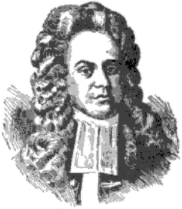Andrew Hamilton (New Jersey governor) facts for kids
Quick facts for kids
Andrew Hamilton
|
|
|---|---|
 |
|
| 4º Governor of East & West New Jersey | |
| In office 1692–1697 |
|
| Preceded by | Edmund Andros |
| Succeeded by | Jeremiah Basse |
| 6th Governor of East & West New Jersey | |
| In office 1699–1703 |
|
| Preceded by | Jeremiah Basse |
| Succeeded by | Office abolished |
| 4th Deputy Governor of East New Jersey | |
| In office 1686–1688 |
|
| Governor | Robert Barclay |
| Preceded by | Lord Neill Campbell |
| Succeeded by | Vacant |
| Deputy Governor of Pennsylvania | |
| In office 1701–1703 |
|
| Governor | William Penn |
| Preceded by | William Penn |
| Succeeded by | Edward Shippen, President of Council |
| Personal details | |
| Born | Scotland |
| Died | 20 April 1703 New Jersey |
| Spouse | Marie Chalmers |
| Children | John Hamilton |
| Occupation | colonial administrator and merchant |
| Signature | |
Andrew Hamilton (who passed away in 1703) was an important leader in early America. He served as the governor of both East and West New Jersey from 1692 to 1697, and then again from 1699 to 1703. He also held a leadership role as Deputy Governor in the nearby Province of Pennsylvania.
Contents
Andrew Hamilton's Life and Work
Early Life and First Steps in America
Andrew Hamilton was born in Scotland. He started his career as a merchant in Edinburgh. He was sent to East Jersey to help bring new settlers there. His good work led to him being recommended for a position on the New Jersey council.
In March 1687, he became the deputy-governor for East Jersey. This happened when the previous Deputy-Governor, Lord Neill Campbell, went back to England for business.
A Difficult Journey to London
Later, a leader named Edmund Andros took control over much of New England. Because of this, Hamilton sailed back to England. He wanted to talk with the owners, called "proprietors," of New Jersey.
However, during his trip, French forces captured his ship. This delayed his journey, and he didn't reach London until May 1690.
First Term as Governor of New Jersey
In March 1692, Andrew Hamilton was chosen to be the governor of both West Jersey and East Jersey. During his time as governor, New Jersey faced many challenges.
- Outside Pressure: The King's government tried to take power away from the proprietors. They wanted to combine New Jersey into a larger colony with New England.
- War with France: New York needed help defending itself during a war with France.
- Money Problems: Many people living in New Jersey refused to pay "quitrents." These were fees for using the land.
The Quakers in West Jersey were against giving money for defense. This was because they believed in peace and did not support war. However, Hamilton and the other council members who were not Quakers managed to get the money needed.
Even with these challenges, Hamilton stayed on good terms with the Quakers. This helped him pass several important laws. During his time as governor, he also started the first colonial postal service.
Why Hamilton Was Removed
Later, the Parliament decided that Hamilton could not be governor. They said that only someone born in England could hold a public position of trust or profit. Since Hamilton was Scottish, he was removed from his role.
Second Term and New Challenges
After a period of poor leadership by Jeremiah Basse, Andrew Hamilton was reappointed governor on August 19, 1699. By this time, the government was very weak.
During his second term, several riots broke out. These were often about taxes. Other riots happened because many settlers did not believe the government was legitimate.
Serving Pennsylvania
In 1701, Andrew Hamilton also became the deputy-governor of Pennsylvania. He was appointed by William Penn, who founded Pennsylvania.
One reason Penn returned to England was a new law being discussed. This law would change who governed the colonies. Although it didn't pass right away, a new law later required the King's approval for governors.
Hamilton also started preparing a defense force in Pennsylvania. This was to show Parliament that the Quaker-led government could help defend the colonies during Queen Anne's War.
His Final Days
While visiting New Jersey, Andrew Hamilton passed away on April 20, 1703.
 | Victor J. Glover |
 | Yvonne Cagle |
 | Jeanette Epps |
 | Bernard A. Harris Jr. |

